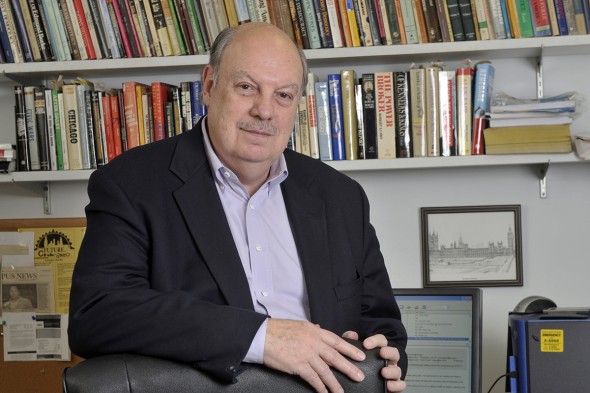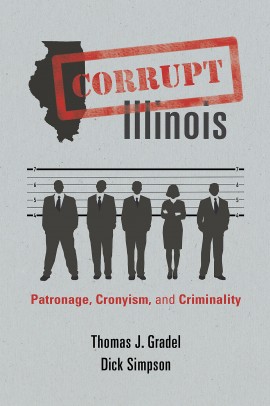Book examines state’s corrupt political culture

“Illinois is among the top three most corrupt states,” says Dick Simpson, professor of political science. — Photo: Roberta Dupuis-Devlin
Seven years of researching and documenting political corruption in Chicago, Cook County and Illinois has yielded a wealth of material for Dick Simpson to produce a new co-authored book that examines the state’s checkered political culture.
Corrupt Illinois: Patronage, Cronyism, and Criminality (University of Illinois Press, 2015) explores the historical roots of the political corruption in Illinois and explains why it continues today.
“Illinois is among the top three most corrupt states and Chicago is undoubtedly the most corrupt city in our nation,” said Simpson, professor of political science.
 Simpson, a former Chicago alderman, and co-author Tom Gradel, a former political media consultant, detail various dishonorable occurrences that begin with vote rigging in 1833, when Chicago was first incorporated, to the criminal convictions of four of the last nine Illinois governors.
Simpson, a former Chicago alderman, and co-author Tom Gradel, a former political media consultant, detail various dishonorable occurrences that begin with vote rigging in 1833, when Chicago was first incorporated, to the criminal convictions of four of the last nine Illinois governors.
Other incidences include a $53 million embezzlement by a downstate official and various crimes that have resulted in the conviction of over 30 Chicago aldermen.
Corruption thrives when political leaders have a monopoly on power, discretion over almost all government actions and little or no accountability, Simpson said.
“This describes the one-party, near-total dominance over politics and government that the Chicago-Cook County Democratic machine has enjoyed for more than 60 years,” he said. “Similar machine-like Republican organizations have flourished in suburban DuPage County and downstate.”
The authors contend that corruption is the lifeline for political machines.
“While all corruption is not caused by machines, all political machines depend on, breed and nurture corruption,” said Gradel, a freelance writer and political researcher. “You can’t have political machines without corrupt hiring practices, crony contracting and conflicts of interest.”
The authors caution that a fail-safe cure for corruption does not exist. They recommend an eight-step program that includes civics education in public schools, inspector generals in the suburbs and public funding of political campaigns.
“Corrupt Illinois is the most comprehensive account of corruption ever published in our state,” former governor Jim Edgar wrote in the book’s foreword. “It proposes cures, which will take decades to implement fully, but which deserve our attention now. We can only move forward by understanding our past and the culture of corruption that too often pervaded our state.”
The book involved research by more than a dozen UIC graduate and undergraduate students over eight years.
“The study of more than 1,900 convicted felons and their patterns of corruption would not have been possible without the efforts of these students,” Simpson said. “In the process, they learned how to do this difficult research with real-world effects.”
